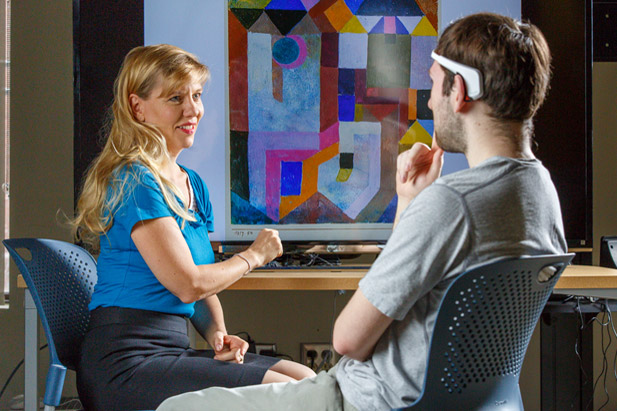Isabel Pedersen’s Canada Research Chair renewed
Extension of Chair in Digital Life, Media and Culture strengthens university’s research portfolio
December 6, 2017

For her outstanding research work at the University of Ontario Institute of Technology, the Government of Canada has renewed Isabel Pedersen’s, PhD, Tier 2 Canada Research Chair (CRC) in Digital Life, Media and Culture.
Building on Dr. Pedersen’s research discoveries and advances over the past five years, the Associate Professor in the Faculty of Social Science and Humanities will spearhead an extensive humanities research agenda called Analyzing the Future of Embodied Technologies.
She will embark on a new focus to broaden research into the cultural, political and subjective condition posed by emergent and disruptive embodied technologies, such as ingestible systems, implantable computer chips, and other human enhancement technologies. Her findings will address the impact of these technologies upon selves, identities, culture, creativity, politics and values.
Quotes
“Being a Canada Research Chair is one of the country’s highest research honours. Dr. Isabel Pedersen’s research explores the nexus between humans and the technology we will use in the future. She asks vital questions we often forget to consider each time a new invention is announced. She examines the impact of proposed immersive technologies, perhaps decades before anyone uses them.”
-Peter Stoett, PhD, Dean, Faculty of Social Science and Humanities
"The Canada Research Chairs program supports the University of Ontario Institute of Technology's capacity to contribute to the advancement of society and turn innovative ideas into real solutions. Dr. Isabel Pedersen’s CRC renewal is a powerful endorsement of her passion to uncover new information and lead discovery in a rapidly evolving field."
-Douglas Holdway, PhD, Vice-President, Research Innovation and International (interim)
University's Canada Research Chairs
- Douglas Holdway, PhD – Tier 1 CRC in Aquatic Toxicology (Faculty of Science)
- Christopher Collins, PhD – Tier 2 CRC in Linguistic Information Visualization (Faculty of Science)
- Pierre Côté, PhD – Tier 2 CRC in Disability Prevention and Rehabilitation (Faculty of Health Sciences)
- Janette Hughes, PhD – Tier 2 CRC in Technology and Pedagogy (Faculty of Education)
- Isabel Pedersen, PhD – Tier 2 CRC in Digital Life, Media and Culture (Faculty of Social Science and Humanities)
- Markus Piro, PhD – Tier 2 CRC in Nuclear Fuels and Materials (Faculty of Energy Systems and Nuclear Science)
- Sheldon S. Williamson, PhD – Tier 2 CRC in Electric Energy Storage Systems for Transportation Electrification (Faculty of Engineering and Applied Science)
The university has four additional CRCs in development.
Canada Research Chair alumni whose research continues at the university:
- Carolyn McGregor, PhD – Tier 2 CRC in Health Informatics (Faculty of Business and Information Technology, 2007 to 2017)
About the CRC program
The CRC program invests approximately $265 million per year to attract and retain some of the world's most accomplished and promising minds. Nearly 1,700 CRC holders are working at more than 70 post-secondary institutions across the country in a wide range of fields. The CRC designation recognizes leading national and international experts in engineering and the natural sciences, health sciences, humanities, and social sciences.
Tier 1 Chairs are outstanding researchers acknowledged by their peers as world leaders in their fields. Valued at $1.4 million, appointments are for seven years and are renewable.
Tier 2 Chairs recognize exceptional emerging researchers, as judged by their peers, with potential to lead in their field. Valued at $500,000, appointments are for five years and renewable once.
Website: chairs-chaires.gc.ca
Media contact
Bryan Oliver
Communications and Marketing
Ontario Tech University
905.721.8668 ext. 6709
bryan.oliver@uoit.ca



